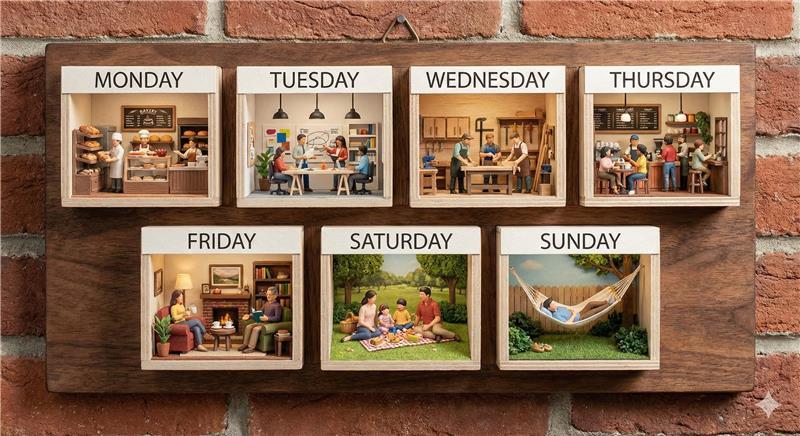How to Know If a Four-Day Workweek Is Right for Your Business
The four-day workweek has become one of the most talked-about workplace shifts of the last decade. Large corporations are experimenting with it....
3 min read
 Eric Joern
· September 11, 2023
Eric Joern
· September 11, 2023

Let’s get this out of the way first – Profit First IS NOT a “set it and forget it” solution. If you’re looking for a hands off solution to your budgeting needs, this isn’t for you. It can be a bit complicated to implement.
Let us also say this: Profit First has been THE BEST system we’ve seen our clients implement as their budgeting system. With it, budgeting makes more sense, you’re able to plan for what you need, and, most importantly, you’ll GROW YOUR BUSINESS.
Is Profit First hard to do? It can be! Will it transform the way your business operates? Absolutely.
Those who know us, know that we’re a Profit First CPA firm. But what does that mean? Well, it’s based on the book Profit First by Mike Michalowicz. At its core, Profit First is a budgeting method that requires a pretty liberal dose of discipline. The idea is to override basic human psychology as defined in Parkinson's Law. Parkinson’s Law states that you expand the time it takes to do something based on the time you have. Now, instead of time, think about money. Basically, as a business owner, you’ll almost always justify spending the money you have in your account if it’s left in a vacuum.
On his website, Mike says, “The method is simple. Every time you get a deposit from sales, take a predetermined percentage of that money as profit. Of course there are a few more steps than just that. But even with the simple first step, of taking your profit first, you will become permanently profitable.”
First, let’s be real. A typical small business owner isn’t making budgets. If you ask a business owner how their business did last month, they’ll probably just talk about the money in their main account. If there’s a lot of money, that’s a good month. If not, it was a bad one. Most business owners run their businesses through their bank accounts.
Profit First leans into this impulse, but instead of one bank account – you’ll be running your business through five separate bank accounts. We won’t get too far into the weeds on this (for that you can read some of our other Profit First blogs) but basically, it’s going to make you take stock of what you have coming in, how much it costs, and what you’ll do with the leftovers.
The best thing that Profit First does is show you how your money is coming in – and what it’s being spent on. Traditional accounting methods often leave business owners overwhelmed with complex spreadsheets and unclear financial snapshots. Profit First simplifies this process by breaking down your income into distinct categories: profit, owner's pay, taxes, and operating expenses.

Although transitioning to the Profit First model might require a bit of hardship and readjustment, the clarity it provides will empower you to make informed decisions about your spending and investments.
That separation of funds ensures that you're not inadvertently overspending or neglecting essential areas of your business. Over time, this clarity facilitates smarter financial decisions, paving the way for long-term growth and stability.
When writing this blog, we had a lot of discussions about “eating healthy.” Typically, when you want to eat healthier, you’ll track your macros every single day. That’s a LOT like the Profit First model. Adopting the Profit First model might be challenging, especially when it necessitates reevaluating your spending habits and making tough decisions. However, these very challenges contribute to fostering a culture of financial discipline within your business. By allocating funds for profit and other essential purposes upfront, you're compelled to work within defined budgetary constraints. That’s a big deal for most small businesses!
While this discipline might feel restrictive at first, it ultimately encourages you to seek creative solutions for achieving your goals without overspending. As you become more adept at managing your finances under this model, you'll find that your resourcefulness improves and wasteful expenditures diminish. This newfound financial discipline can significantly enhance the overall efficiency and resilience of your small business.
Small business owners often focus on immediate revenue generation, sometimes at the expense of long-term sustainability. The Profit First model encourages you to prioritize profit, ensuring that your business remains viable not just today, but well into the future. Despite the initial challenges of allocating a portion of your income to profit, doing so lays the foundation for your business's stability and growth.
By implementing Profit First, you're essentially building a financial safety net. This safety net enables you to weather economic downturns, invest in strategic initiatives, and plan for expansion. While it might be difficult to divert funds from operating expenses to profit initially, the long-term benefits of sustained success (and resilience) make implementing Profit First a huge boon for most small businesses.
Are you ready to talk to a CPA that’s familiar with the Profit First system? We’d love to set up time for a no-pressure phone call with one of our accounting professionals.

The four-day workweek has become one of the most talked-about workplace shifts of the last decade. Large corporations are experimenting with it....

We've all seen the headlines. Another major company announces that everyone needs to be back at their desk. No exceptions. And if you're running a...

If you work with a payroll provider for your small business, payroll typically runs on a set schedule with very little day-to-day involvement from...